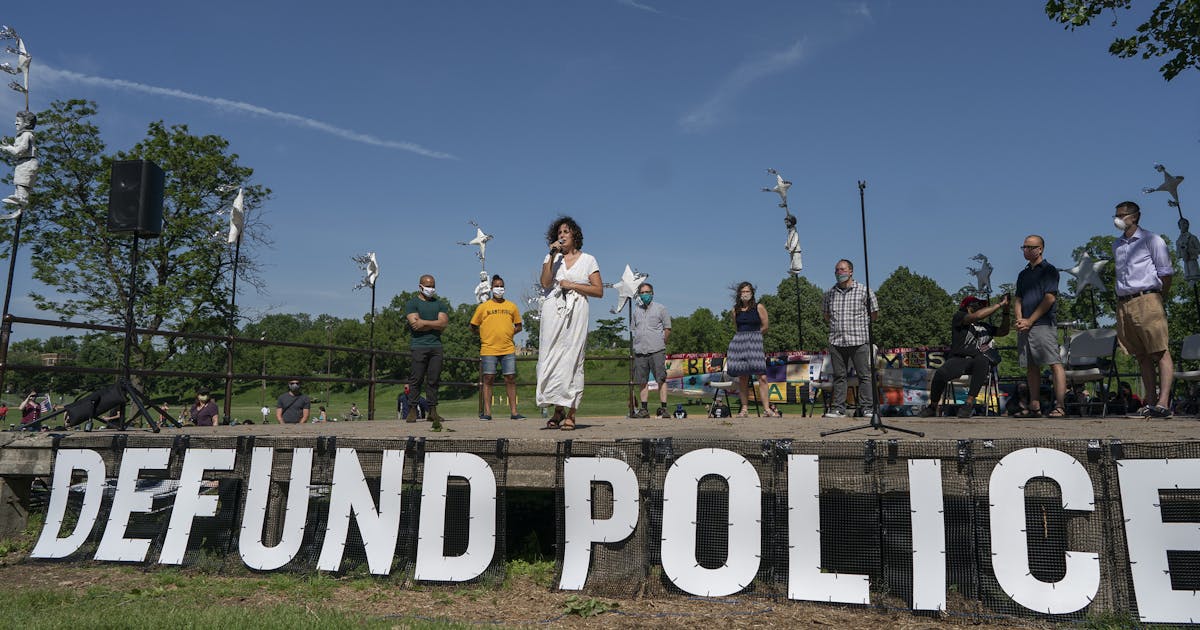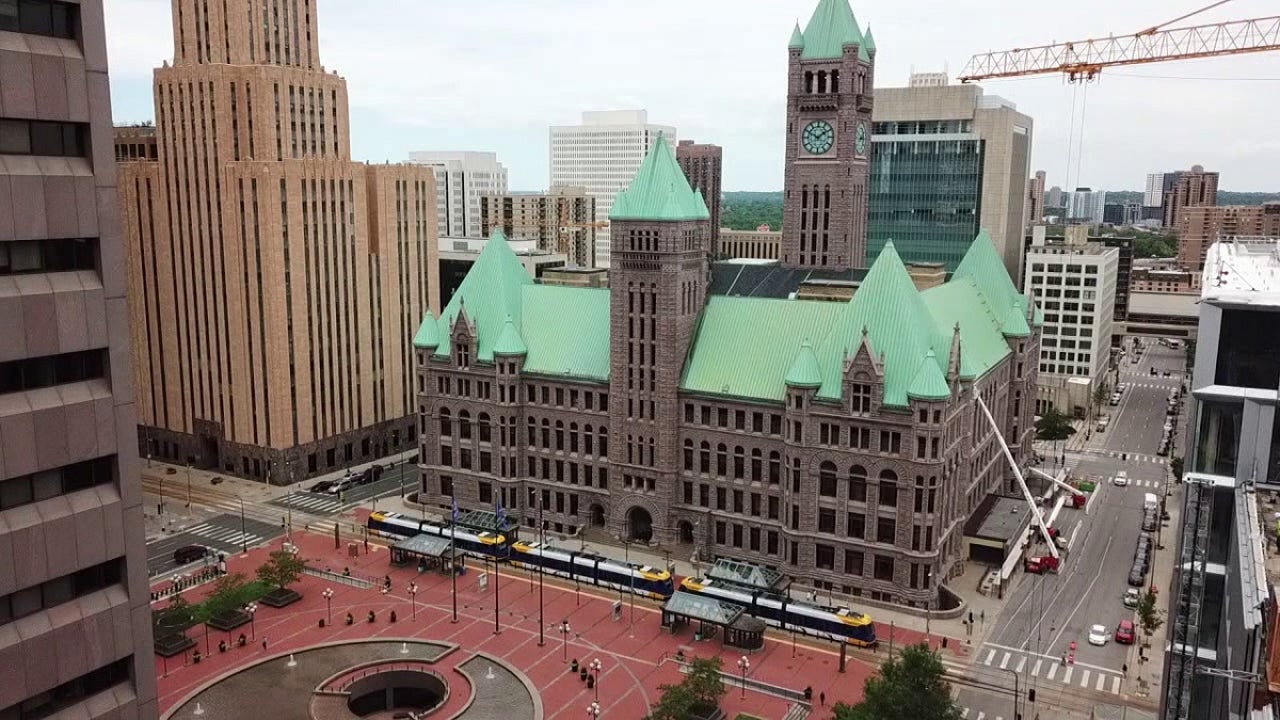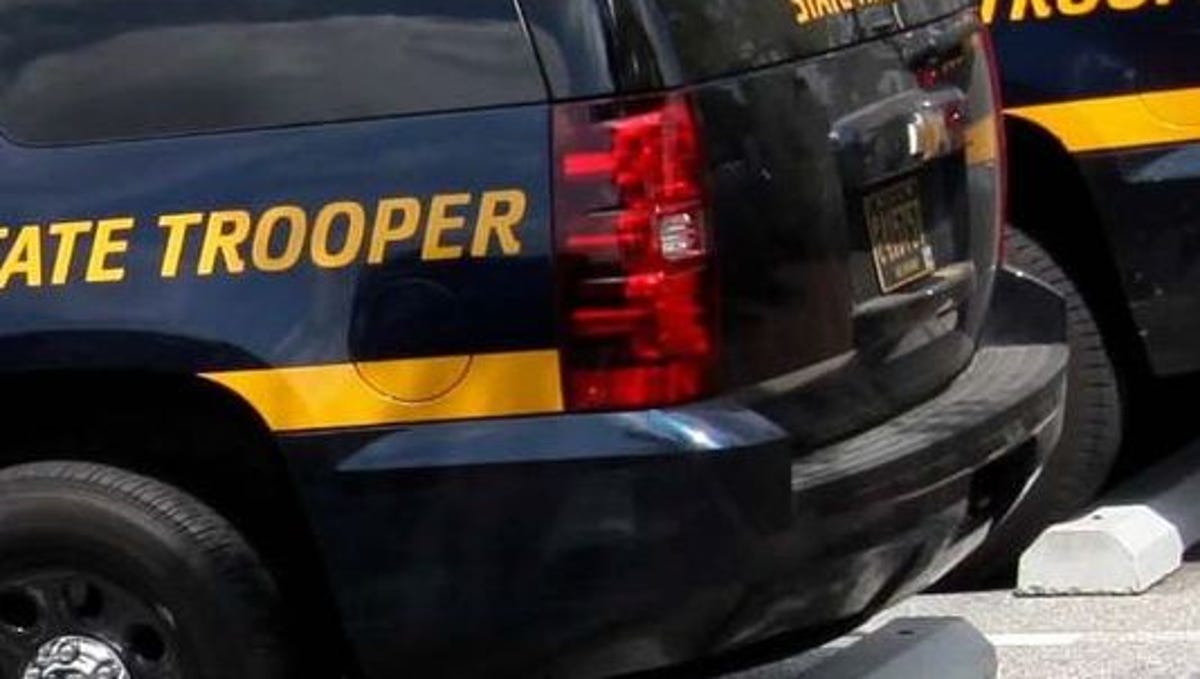Minneapolis, MN
Trump administration denied Minneapolis nearly $1 million over ‘defund the police’ comments

Trump administration officials used a “seriously flawed” process when the rejected a Minneapolis grant request over City Council members’ support for the defund the police movement, according to a newly released audit.
The Bureau of Justice Assistance denied Minneapolis’s 2020 application for $900,000 to address opioid overdoses, according to the report published this month by the Department of Justice inspector general.
“BJA’s justification for denying Minneapolis funding contained critical errors and omissions that we believe rendered the justification inadequate,” the inspector general’s office wrote.
The federal denial came as opioid overdose deaths across Minnesota were skyrocketing. The number of deadly overdoses involving opioids more than doubled from 2019 to 2021, according to Minnesota Department of Health data.
The city had proposed using the dollars for a three-year Law Enforcement Assisted Diversion project. It aimed to reduce the number of people having run-ins with law enforcement and the corrections system and cut down on opioid overdoses.
“The City of Minneapolis is losing community members to the opioid epidemic at an alarming rate,” Minneapolis Health Department Deputy Commissioner Heidi Ritchie said in a statement Tuesday. “To combat this crisis, the City is looking for new and innovative ways to help our community members who are struggling with opioid misuse. We welcome any opportunity for funds to assist our response.”
Minneapolis was one of 212 groups that applied for federal funding in 2020 through the Comprehensive Opioid, Stimulant, and Substance Abuse Program.
The city received the second-highest peer review score of any application. The Bureau of Justice Assistance ultimately recommended distributing $147 million to 110 of the 212 applicants. Minneapolis was not among them.
Minneapolis had applied for the nearly $1 million in May 2020, four days before a police officer murdered George Floyd. As federal officials considered the city’s application, nine of the 13 council members expressed support for starting “the process of ending the Minneapolis Police Department.”
That July the Bureau of Justice Assistance sent a memo with its funding recommendations to the Office of Justice Programs for approval and cited “statements of governing officials and recent news reports” as the reason Minneapolis was left out, according to the recent audit.
“The BJA [Acting] Director is extremely concerned that Minneapolis officials do not understand the impact of defunding their police, and does not believe that this law enforcement grant can be properly administered without a vibrant, fully funded police department,” the memo stated.
Minneapolis was not the only community considering “defund the police” measures after Floyd’s killing, the audit states, noting that officials in Los Angeles were also talking about such measures.
However, that community wasn’t removed from the running for grant dollars. Los Angeles County submitted a similar project to what Minneapolis proposed and ranked 68th among the applicants. It received $1.2 million.
“It’s really unfortunate” that Minneapolis, despite its high application score, was targeted over City Council members’ comments, said Brian Zirbes, executive director of the Minnesota Association of Resources for Recovery and Chemical Health.
Zirbes has experience with government funding requests from a previous job at the Minneapolis Department of Human services. He said there it was “almost unheard of” to reject a top-scoring grant applicant. That denial “is kind of shocking,” he said.
“Overdose death rates are at an all-time high in Minnesota and are having a disproportionate impact in Black and Brown communities,” Zirbes said. “We need a comprehensive approach to address this problem.”

Minneapolis, MN
Minneapolis City Council introduces new safety plan with alternatives to police response

Minneapolis leaders lay out new safety plan
The new plan folds in efforts already underway like the behavioral response team which is sent on some crisis calls where police are not necessary, or a new traffic control unit that is staffed by people who are not sworn officers. But the real purpose of the Safe and Thriving Communities plan is to offer a sort of road map to public safety.
MINNEAPOLIS (FOX 9) – Minneapolis City Council members are asking the public for feedback on a new public safety model that they hope will restore trust in public safety services.
Officials say the Public Safety Beyond Policing Action Plan is based on an outline of a community safety system that will include “preventative, restorative and response services beyond policing.”
What we know
City leaders say they are moving to codify the Public Safety Beyond Policing Action Plan after the Minneapolis Safe and Thriving Communities Blueprint that was announced last year.
READ MORE: Minneapolis leaders lay out a new plan for community safety
The first draft of the Public Safety Beyond Policing Action Plan was presented earlier this week. City officials say public comment and feedback on the 10-year plan will be taken for 45 days.
An overview and briefing detailing the progress of the Safe and Thriving Communities Report was presented during Wednesday’s Public Health and Safety Committee (PHS).
Public engagement and comment sessions will also be held in front of the PHS committee before the final adoption of the plan, which is expected to happen in the fall of 2024.
What they’re saying
Minneapolis officials say “there has been little or unclear movement on implementation by the administration” since the last city-wide community safety plan last year.
A news release announcing the latest policing plan said there are concerns over a “lack of seriousness” about the city implementing a new comprehensive safety system.
Vice Chair of the Public Health and Safety Committee and City Council Member Robin Wonsley said the following in the same news release: “Council is serious about realizing the comprehensive public safety system that our residents have asked for since May 2020. We can have a city where there are a multitude of preventive, responsive, and restorative services to meet our public safety needs efficiently and equitably. The Safe and Thriving Communities Report and the Public Safety Beyond Policing Action Plan includes a clear ten-year guide to make this vision a reality.”
Public Health and Safety Chair and City Council Member Chavez said “Ward 9 is home to one of the most diverse communities in the whole state and residents are deeply engaged in leading on public safety work. Residents are tired of empty promises and slow progress when it comes to their safety needs. The time to act is now and the Council is ready to continue to lead on keeping all of us safe.”
Minneapolis City Council President Elliot Paynes released a statement saying “This is the City Council flexing our oversight responsibility. The administration put forward a plan with the Safe and Thriving Communities report and we are making sure the promise of this plan is fulfilled with transparency and with the input of our community at the center of it.”
Background
This is the latest development after the Safe and Thriving Communities plan was announced last year. Advocates say it took a “holistic approach” to public safety.
That plan came after the development of a plan was requested by Mayor Jacob Frey in 2021.
City officials say they are currently in phase one of implementing the Safe and Thriving Communities plan.
The Minneapolis City Council also approved a new police contract earlier this month that includes a nearly 22% pay raise for officers over the next three years.
Minneapolis, MN
Minneapolis park board, striking workers reach tentative deal

Watch CBS News
Be the first to know
Get browser notifications for breaking news, live events, and exclusive reporting.
Minneapolis, MN
Minneapolis crisis response team handles thousands of calls once routed to police

Riding along with the Minneapolis crisis response team
The Minneapolis crisis response team, formed as an alternative to police after the murder of George Floyd, has responded to more than 20,000 calls. FOX 9 Investigator, Nathan O’Neal, has the story.
MINNEAPOLIS (FOX 9) – The Minneapolis crisis response team, which was formed as an alternative to police after the murder of George Floyd, has responded to more than 20,000 calls since it was formed – handling calls ranging from mental health to homelessness and addiction.
Why it matters
The Minneapolis Behavioral Crisis Response (BCR) team was formed in 2021 and was cited as a critical tool for police reform by the Department of Justice.
The DOJ called the Minneapolis crisis team a “compassionate alternative response” after investigating the Minneapolis Police Department.
“We have entirely revamped our safety system,” said Minneapolis Mayor Jacob Frey. “When we get a difficult call in right now, it’s not just about sending officers with a gun to this particular problem.”
How it helps
On a recent day in July, the FOX 9 Investigators joined the crisis response team in Minneapolis. The team responded to welfare checks and mentally distressed residents all over the city.
“It’s really powerful to be able to listen to what the person is going through because what I see as a crisis is completely different from what they’re going through,” said behavior crisis responder Elias Rosas-Lee.
During one call, the team aided a woman in distress who had not eaten nor taken her medication in a few days. The team helped stabilize the woman, who had a known mental health history, and contacted her social worker.
“We can’t save anybody, they have to save themselves,” said behavioral crisis responder David Ruth. “But what we could do is give them the proper resources and hope.”
How it’s going
The service was launched in 2021 and is free to the public. It was expanded to a 24/7 service last year.
“All over the country folks are calling for an alternative response,” said Keara Nadeau-Grandy, director of clinical operations at Canopy Roots, which operates the crisis team.
The BCR team is unarmed and responds to calls that have been screened to ensure there is no violence involved.
“Everybody always thinks about the situations where law enforcement has been involved – and it has not turned out very well, “said Nadeau-Grandy. “We hope that we can reduce those incidents.
-

 World1 week ago
World1 week agoOne dead after car crashes into restaurant in Paris
-

 Midwest1 week ago
Midwest1 week agoMichigan rep posts video response to Stephen Colbert's joke about his RNC speech: 'Touché'
-

 News1 week ago
News1 week agoVideo: Young Republicans on Why Their Party Isn’t Reaching Gen Z (And What They Can Do About It)
-

 Movie Reviews1 week ago
Movie Reviews1 week agoMovie Review: A new generation drives into the storm in rousing ‘Twisters’
-

 News1 week ago
News1 week agoIn Milwaukee, Black Voters Struggle to Find a Home With Either Party
-

 Politics1 week ago
Politics1 week agoFox News Politics: The Call is Coming from Inside the House
-

 News1 week ago
News1 week agoVideo: J.D. Vance Accepts Vice-Presidential Nomination
-

 World1 week ago
World1 week agoTrump to take RNC stage for first speech since assassination attempt















